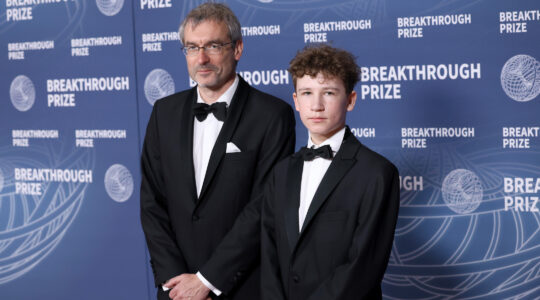
The Australian Broadcasting Corp,’s investigation alleged that Ben Zygier, seen here in his Israeli army uniform, was a Mossad agent but offered no proof.
(Photo supplied)
SYDNEY (JTA) — More information has begun to trickle out about the mysterious man known as Prisoner X who hanged himself in Israel’s Ayalon Prison in 2010.
The Australian Broadcasting Corp.’s “Foreign Correspondent” program made headlines worldwide when it reported this week that the prisoner, whose identity was so secret that even his jailers did not know it, was a Jewish immigrant to Israel from Melbourne named Ben Zygier. The program claimed it had “compelling evidence” that the inmate incarcerated for several months in the suicide-proof cell built specifically for Yitzhak Rabin’s assassin was Zygier and that he had worked with the Mossad, Israel’s foreign intelligence agency.
Zygier was 34 when he died on Dec. 15, 2010 from “asphyxiation by hanging,” according to documents obtained by the TV investigation.
Israel had imposed a strict gag order on the case that forbade publication of any details related to the case — or even the existence of the prisoner. When Israeli media outlets began to report this week about the Australian news report, Israeli authorities ordered them to be deleted.
On Wednesday, however, the gag order was lifted a day after Knesset members began to raise questions about the case in Israel’s parliament.
Zygier is no stranger in the Australian Jewish community. His father, Geoffrey, is the executive director of B’nai B’rith’s Anti-Defamation Commission. At the time of his son’s death, he was executive director of the Jewish Community Council of Victoria. Geoffrey Zygier did not respond to JTA’s inquiries this week about his son.
Zygier’s mother, Louise, worked at Melbourne’s Monash University and helped raise funds for its Jewish center.
Zygier himself went to two Jewish day schools in Melbourne, King David and Bialik College. He was a member of the Jewish youth movement Hashomer Hatzair and spent significant time in Israel, where he graduated from the Machon leadership program in Jerusalem. He lived for a while at Kibbutz Gazit, in Israel’s Galilee region. Back in Australia, he worked at the Deacons law firm in Melbourne before immigrating to Israel and assuming the name Ben Alon, according to acquaintances.
He eventually married an Israeli woman and lived in Raanana, a suburb of Tel Aviv, with his wife and two children.
The Australian network’s report said Zygier had another Australian passport under the name Ben Allen, and that he was connected to the Mossad, but the program offered no conclusive proof. Ex-Mossad officials reached in Israel told reporters they had no comment.
Australian Foreign Affairs Minister Bob Carr ordered a review of the case on Wednesday in light of the “Foreign Correspondent” probe. Carr said he understood that consular officials were neither informed that an Australian was in jail nor that he had died in prison.
The first the government heard of the case was when family members contacted the Australian consulate in Israel to seek help repatriating Zygier’s body for burial in Melbourne.
It emerged on Wednesday that Israel had informed an Australian diplomat of Zygier’s jailing but that the diplomat had not passed on the information through the requisite channels.
Meanwhile, members of Australia’s Jewish community shared the details they knew about Zygier’s earlier life. One Hashomer friend who was on Kibbutz Gazit with Zygier in 1994 said that Zygier “never struck me as someone who was stable.”
“I could never imagine someone like that being good for Mossad,” said the acquaintance, who like most acquaintances interviewed about Zygier did not want to be identified. “Also, Ben talked too much.”
Another acquaintance said, “I remember hanging out in Israel with him in 1996. He was a nice guy, a bit lost. Next I heard was that he died in Israel. At the time, what the family understood to be the case was that he was overseas on a [Mossad] operation, then they got confirmation he had committed suicide. It crushed the family.”
Reached by JTA, Zygier’s cousin, Marlon Dubs, said, “I have nothing to add, nothing at all.”
The family’s rabbi, Shimshon Yurkowicz of Chabad, declined to confirm or deny anything to do with the Australian network’s report.
Zygier’s uncle said the family was in mourning.
“I saw that show last night. I have no idea what is true and what isn’t true,” Willy Zygier told The Age newspaper on Wednesday. “All I know is there is a family tragedy. Every suicide is a family tragedy.”
A spokesman for the family told the newspaper that the family would not be releasing a statement.
Others who know the family said the parents were devastated in 2010 by their son’s death.
“They were absolutely shocked, it was just terrible,” recalled Danny Lamm, president of the Executive Council of Australian Jewry. Lamm said he had no current information on the case.
“There was a complete shutdown,” said someone else about circumstances surrounding Zygier’s death. “No one knew what the story was. The parents crumbled. They cut off from life. They were broken. They completely withdrew from everything for two years.”
Both of Zygier’s parents quit the Jewish community posts they held around the time of Zygier’s death.
“The poor parents have suffered enough till now,” one former Jewish community leader told JTA. “No one acknowledged there was suicide. There were rumors he was Mossad, but no one knew, there was such secrecy.”
The Israeli Embassy in Canberra did not respond to a request for comment. Philip Chester, president of the Zionist Council of Australia, said, “We know absolutely nothing about the allegations in the story.”
The gag order placed on Israeli media for stories about Prisoner X was unusually strict. Citing “a serious breach of the state’s security,” the order forbade Israeli media not just from reporting any details about the case but also from noting the Australian Broadcasting Corp.’s report this week. Shortly after the report aired, Prime Minister Benjamin Netanyahu summoned top editors to reaffirm the importance of the suppression order.
JTA has documented Jewish history in real-time for over a century. Keep our journalism strong by joining us in supporting independent, award-winning reporting.





